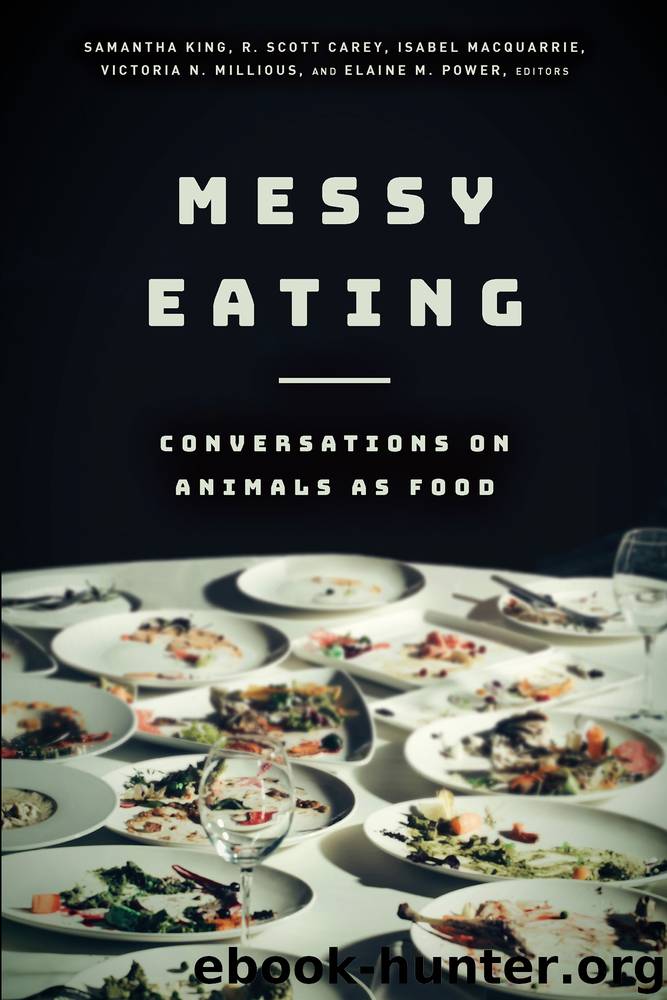Messy Eating by unknow

Author:unknow
Language: eng
Format: epub
Publisher: Lightning Source Inc. (Tier 2)
Published: 2019-03-05T16:00:00+00:00
CHAPTER 9
Disability and Interdependence
Sunaura Taylor
Even as a young child, Sunaura Taylor, now an artist, activist, and disability and animal studies scholar, understood that humans, animals, and the environment are intensely interconnected. Taylor’s ecological orientation is not simply an intellectual focus but rather a set of political beliefs she endeavors to embody in her everyday life, though she admits that doing so is rarely easy. Taylor’s work demands that audiences rethink the worthiness of vulnerability, of dependency, and of interdependency, particularly as these concepts speak to shared experiences among all living organisms in times of environmental turmoil and fragility. We discuss humane meat, vegan parenting, and the behavioral shifts that can occur when emotional knowledges synchronize with cognitive truths. We interviewed Taylor by Skype on February 16, 2017.
SUNAURA TAYLOR: Could you tell me a bit about the project, just to refresh?
SAMANTHA KING: Sure. The project emerged from several different directions, but in part it was inspired by an interview with Donna Haraway, where she describes her complex relationship to eating meat. We were intrigued by her response and began thinking about other scholars who primarily write about multispecies relationships but who have not explicitly addressed questions of food in their work. We felt there was a gap in that literature. But we also ended up speaking with a small number of people like yourself, who have written about or addressed those questions. And we wanted to give scholars who address eating animals in concert with questions of colonialism, race, disability, sexuality, and so on a chance to talk about those connections and to address the normativity of multispecies ethics.
ST: That’s exciting! It is fascinating to me how the ways in which we consume animals on a daily basis—whether through clothing or through food or whatever—is often absent within animal studies. So I love that you all are asking people to grapple with it more. I think that’s great.
SK: Well, thank you. At some point you will get to read each other’s interviews. It would also be cool to bring the contributors together in order to have that conversation. So stay tuned!
VICTORIA MILLIOUS: So we’ll start at the beginning. Could you talk about when and where you were born and raised and your formative, cultural, intellectual, political experiences?
ST: I was born in Tucson, Arizona, and, no doubt the most obvious formative experience is that I was born disabled. From a very young age I had an understanding that my disability was caused by water contamination in Tucson. Specifically, it was military pollution that affected largely Latinx communities on the Southside and also a portion of Tohono O’odham land. So from a really early age that knowledge, combined with the fact that my parents were and are very creative, unconventional, and progressive people, created an environment where thinking about political and social justice issues was just part of our daily lives. Also, my mom had been vegetarian for a large part of her life, so thanks to her, including animals in our broader understandings of justice always made sense to our family.
Download
This site does not store any files on its server. We only index and link to content provided by other sites. Please contact the content providers to delete copyright contents if any and email us, we'll remove relevant links or contents immediately.
Adulting by Kelly Williams Brown(4574)
Drawing Cutting Edge Anatomy by Christopher Hart(3526)
Figure Drawing for Artists by Steve Huston(3451)
Draw Your Day by Samantha Dion Baker(3362)
Drawing Shortcuts: Developing Quick Drawing Skills Using Today's Technology by Leggitt Jim(3080)
Make Comics Like the Pros by Greg Pak(2916)
Rapid Viz: A New Method for the Rapid Visualization of Ideas by Kurt Hanks & Larry Belliston(2906)
0041152001443424520 .pdf by Unknown(2845)
How The Mind Works by Steven Pinker(2816)
How Proust Can Change Your Life by Alain De Botton(2811)
Draw to Win: A Crash Course on How to Lead, Sell, and Innovate With Your Visual Mind by Dan Roam(2784)
Day by Elie Wiesel(2782)
Draw-A-Saurus by James Silvani(2718)
Tattoo Art by Doralba Picerno(2666)
Modern Cartooning by Christopher Hart(2618)
Learn Drawing Quickly by Sharon Finmark(2574)
Poses for Artists Volume 2 - Standing Poses: An essential reference for figure drawing and the human form. (Inspiring Art and Artists) by Justin Martin(2565)
Drawing and Painting Birds by Tim Wootton(2510)
Poses for Artists - Dynamic & Sitting: An essential reference for figure drawing and the human form (Inspiring Art and Artists Book 1) by Justin R Martin(2491)
